Weston-super-Mare's See Monster closes, but what will be its legacy?
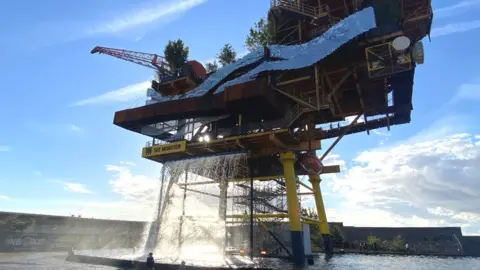 BBC
BBCIt has towered over Weston-Super-Mare's seafront for the past two months, but See Monster has now closed its doors. The former offshore platform-turned-art-installation split opinions from the start and has even caused controversy.
Funded by the government, it cost millions of pounds, but it was also very popular. So has it been a success and what will be its legacy?
When the 35m structure was first announced, there was a bold vision from the organisers.
It aimed to inspire conversations about renewables, the British weather, and even aspired to transform perceptions about how out-of-date industrial infrastructure could be disposed.
Featuring four levels and hosting a wild garden of plants, grasses and trees, as well as an amphitheatre, and a waterfall, it was certainly spectacular with ambitions to match.
Running two months late, it is fair to say, there was a lot of pressure when it finally opened to the public on 23 September.
But between then and it closing on 20 November, love it or hate it, it has certainly provoked conversations.
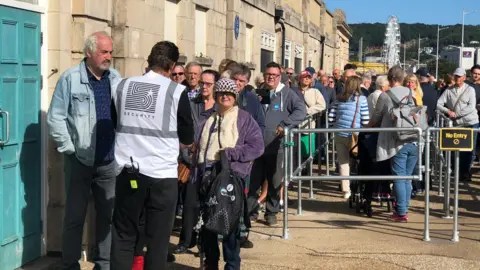
More than half a million people interacted with the installation and it brought more people to Weston-super-Mare's seafront than was ever hoped for, North Somerset Council said.
Executive member for placemaking and growth, Mark Canniford, said: "Businesses have fed back that tens of thousands more visitors have come to the town centre, with The Sovereign, based in the high street, seeing over 50,000 more shoppers come through their doors.
"Locally it has certainly been worth it, nationally [the cost] is a question for government and a question for our MP, but locally it has had a huge impact on our local economy, and it's been great."
The project was the brainchild of Leeds-based design and events company NewSubstance and formed part of the Unboxed: Creativity in the UK festival.
North Somerset Council is currently examining the economic impact See Monster has had on the town, with a report expected to be published at the end of the year.
But if you speak to business owners, most seem to agree it has been good for the town.
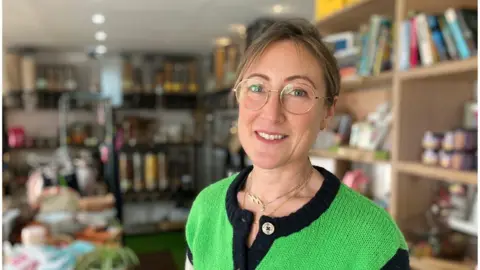
Clare Morris, who runs local shop, Good and Proper Zero, said: "It's been fantastic. I've absolutely loved coming myself and seeing all the extra visitors that we've had in the shop.
"I've got lots of extra outside seating and you can just see that they are not regulars, and they are not locals, and it is just been a joy to watch it evolve."
Fish and chip shop owner, Sue Waterhouse, added: "We've been very busy. A lot of people have travelled for the See Monster, certainly in the half term.
"Often we chat to them and they say whether they have been up, some people have queued two or three hours sometimes.
"It's certainly the best year we've had in the seven years we've been here, at this time of year, for sure."
See Monster was originally expected to open from July.
While the delay was highly criticised locally, organisers were keen to point out it was a "world first" and perhaps, given its scale, it was inevitable it would run into some issues.
But there were also those who welcomed the delay and suggested how that, combined with good weather through the autumn, might have helped to prolong the tourist season.
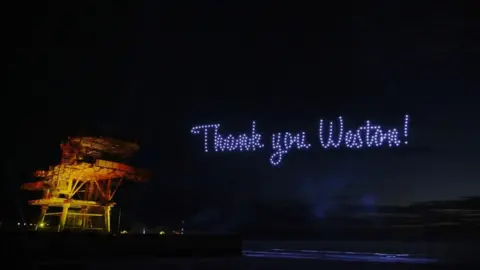 Sodium Films
Sodium FilmsChair of the Business Improvement District in Weston, Paul Batts, said businesses on the sea front, and those further back in the town, had welcomed people come in from "all over the country as well as abroad".
"It has been a huge talking point locally and getting people talking about Weston which is also important," he added.
While there was scepticism among some at first, Mr Batts said he felt the turning point was a drone show that attracted tens of thousands of people to the sea front.
"There was a palpable awe when those drones lit up and the monster was illuminated in all the different colours," he said.
"It changed a lot of people from 'what is this all about' to 'wow, this is a world first, not done anywhere else'...and that is really nice, there is literally nothing else to compare to it."
Executive director of Unboxed, Phil Batty, said "This extraordinary installation has captured the imaginations of local people and visitors to Weston, extending the season and boosting the economy of this great seaside town."
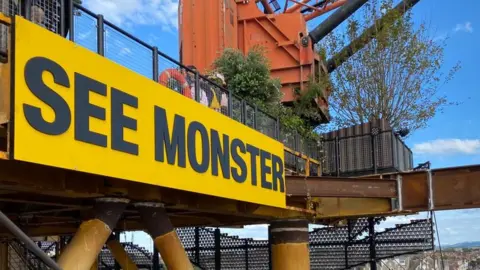
Not everyone was won round though.
The individual cost of See Monster has not been revealed, but Unboxed - which ran 10 large-scale public art engagement projects across the UK - has received wide criticism about the £120m cost to the taxpayer.
Unboxed is now being investigated by the public spending watchdog, the National Audit Office, with the findings of its investigation due in the next few weeks.
Weston resident Mandy Moore, said: "I don't think it is worth the money.
"The tax payers pay for it. It is lovely to look at, but I do think it could have been spent in other ways."
Her daughter, Abby, added: "I don't really think much of it to be honest.
"The views are nice, but it is a bit random.
"It has brought a lot of people into Weston, but apart from that I don't think it has done much else, and now it is going after all that money being paid for it."
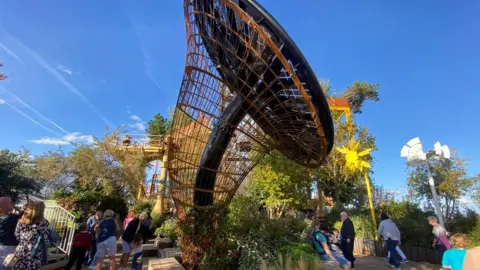
Niccy Hallifax, project director of Newsubstance, which was behind the See Monster project, said: "We've had thousands and thousands of people come here... from all over the world to actually experience something that has never been done before.
"And also, when we were doing the pitching processes, that was during Covid and it has kept loads of us, hundred and hundreds of us, in the industry, when we wouldn't have been able to afford to otherwise, so for me it has definitely been worth it."
See Monster will be dismantled over the next few months and 100% of it is due to be recycled.
"All the plants will go to create a new park area on the sea front... so there will be a legacy to See Monster," Ms Hallifax said.
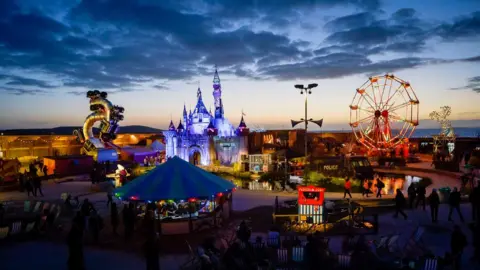 PA
PAWhile See Monster is unique, if you were forced to compare it to something, it would have to be Banksy's Dismaland.
The dark attraction came to Weston-super-Mare in 2015 and was a huge success.
Tourism bosses claimed it brought more than 150,000 paying visitors and £20m into the town.
But one of the things it was criticised for was having not left "a legacy". It was there and then it was gone.
Look around the town now, and you could be forgiven for not knowing it had happened at all.
Ms Hallifax said she hoped that would not be the case for See Monster.
As well as a new community garden created on the Beach Lawns from See Monster's plants, Ms Hallifax said the more important legacy would be the impression it left on the thousands of young children who visited it.
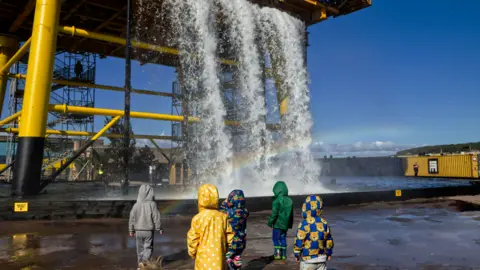 Neil O'Donoghue
Neil O'DonoghueSee Monster welcomed more than 70,000 school children, young people, scouts, youth groups and students on educational trips focusing on Science, Technology, Engineering, Mathematics (STEM), climate, the environment and culture.
Schools across the UK were also invited to take part in the All Aboard See Monster assembly, in which pupils aged 7-11 were able to climb aboard the offshore platform virtually to learn about reuse, the water cycle and the great British weather from the scientists and artists who created See Monster.
"That is important to emphasise," Ms Hallifax said.
It would be the children who would be affected the most by climate change, she said, and as such she hoped the project had convinced them of the benefits of reusing and how much it could enhance the location it was in, she added.
See Monster must now come down and was always designed to be a temporary installation.
It was a platform for conversation and "that has now been had, and it is time for that to continue in a different way", Ms Hallifax said.
If See Monster's lasting legacy is to educate the next generation, it could be some time before we can really know how successful it was.

Follow BBC West on Facebook, Twitter and Instagram. Send your story ideas to: [email protected]
